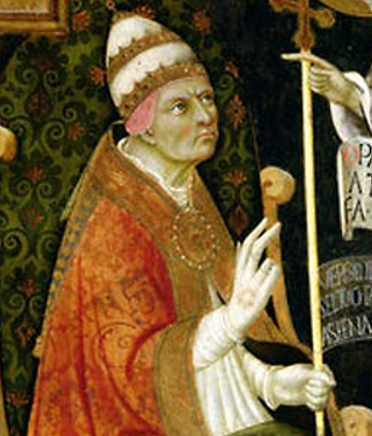9: Rebuilding Rome, Rebuilding the Church
Martin V (Oddone Colonna) 1417-31
Eugenius IV (Gabriele Condulmer) 1431-47
Nicholas V (Tommaso Parentucelli) 1447-55
Callixtus III (Alfonso Borgia) 1455-58
Pius II (Enea Silvio Piccolomini) 1448-64
Paul II (Pietro Barbo) 1464-71
Sixtus IV (Francesco dello Rovere) 1471-84
Innocent VIII (Giovanni Battista Cibo) 1484-92
Alexander VI (Rodrigo Borgia) 1494-1503
Pius III (Francesco Todeschini Piccolomini) 1503 (22 sept-18 Oct)
Julius II (Giuliano dello Rovere) 1503-13
Leo X (Giovanni de’ Medici) 1513-22
Hadrian VI (Adrian Florensz) 1522-23
Clement VII (Giulio de’ Medici) 1523-34
Paul III (alessandro Farnese) 1534-49
Julius III (Giovanni Maria Ciocchi del Monte) 1550-55
Marcellus II (Marcello Cevini degli Spannochi) 1555 (9 April-1 May)
Paul IV (Gian Pietro Carafa) 1555-59
Pius IV (Giovanni Angelo Medici 1559-65
Restoring papal administration
Financing papal administration: another whole story
Rome as regional leader
- New balance of power across peninsula
- Europe’s political leaders: a power and a diplomatic center
- Old elite families play on a wider stage
Popes from Italy (except Hadrian VI)
College of Cardinals: international favors as well as local clout
Nepotism and church positions
Nicholas V: a humanist and more (1447-55)
Rise to power: Council of Florence
1453 fall of Constantinople
1454 Peace of Lodi; Lega Italica 1455
- Milan-Venice-Florence-Rome-Naples
Diplomacy: Portugal, Aragon and Atlantic trade
Humanists: College of Abbreviatores, more
Rebuilding Rome
Began new Vatican Library
Rome Reborn: from the Vatican Library exhibit at Library of Congress
Callixtus III 1455-58 
- Law professor
- Efforts to organize Christian troops against Ottoman Expansion
- Detail: Callixtus III, Sano di Pietro ca 1455
Pius II 1458-64 Aeneas Silvius Piccolomini
- Humanist education
- Patronage of humanists
- Council at Mantua: effort to organize against Ottomans
- Diplomacy: succession in Naples from Alfonso (d.1458) to Ferrante (d. 1494)
- 1460 revolts in Rome
Bernardino Pinturicchio (ca 1452-1513): Pius II canonizing Saint Catherine of Siena in 1461, 1505-1508. Siena, Piccolomini Library
Paul II 1464-71 Pietro Barbo, nephew of Eugenius IV
- A bundle of contradictions
- 1468 suspected conspiracy
- Secret cardinals
- Dissolved College of Abbreviatores
- supporter of arts
Mino da Fiesole, ca. 1464-1470: portrait bust of Paul II. Museo del Palazzo Venezia, Rome
Sixtus IV (1471-84) Francesco della Rovere
- supporter of humanists
- nepotism: 6 nephews as cardinals; lay lordships in papal states
- Girolamo Riario, a leader in Pazzi conspiracy of 1478 (Florence and region)
- Rebuilding of city continues
Innocent VIII (1484-92). Giovanni Battista Cibo
1485 another revolt of barons against Ferrante I of Naples; invites Charles VIII to succeed
Alexander VI (1492-1503) Roderigo Borgia
Nepotism
Pope as political power in Italy
1494 death of Ferrante of Naples; Alfonso II succeeds; Charles VIII (France) exercises claim
Roman barons ally with various powers
1495 Holy league formed: Rome, HRE, Venice, Milan, Spain
1498: alliance with Louis XII: duchy in France for Cesare (Valentinois); Cesare ruler of Romagna; papal states (parts) as potential family dynasty
Pius III 1503 Francesco Todeschini Piccolomini nephew of Pius II
Plans for peacemaking
Julius II 1503-13 Giuliano della Rovere (nephew of Sixtus IV)

Efforts to recover papal states
Multiple roles of pope
Raphael, portrait of Julius II, 1511-12. London, National Gallery
Popes Building Renaissance Rome
Revolutions in painting, architecture, sculpture
Florence, first half 15th century
Leon Battista Alberti, his circle: Filippo Brunelleschi, Donatello, Masaccio
Donatello, Filippo Brunelleschi probably in Rome 1402-4
From Council of Florence to Rome: era of Nicholas V
What needs building, rebuilding, or renovating:
- Churches
- Residences
- city infrastructure: bridges, aqueducts, fountains, roads, walls
Early commissions (Martin V, Eugenius IV): mostly smaller art works
S Clemente: another fresco by Masolino
Nicholas V (1447-1455)
maestri delle strade
Acqua Vergine (later Trevi Fountain)
plans for Borgo
Palazzo dei Conservatori remodeled
St Peters
Vatican Palace
Library (early stages)
Paul II (1464-71)
Palazzo Venezia: Renaissance palazzo, papal residence

San Marco: grand portal and loggia
Sixtus IV (1471-84)
more work on Acqua Vergine
streets in Borgo
Sistine chapel (first mass 15 Aug 1483)
1475 Vatican Library opened
Innocent VIII (1484-92).
Papal residence at Vatican
Alexander VI (1492-1503)
Vatican Borgia apartments
Domus Aurea discovered
Vatican Library
1451: Nicholas V, personal collection plus purchases from Constantinople (imperial library)
1475 Sixtus IV “Palatine Library”
early circulation record: Pico della Mirandola checks out works of Roger Bacon
Platina: Lives of Jesus and the Popes
Papal image: from The Young Pope (Paolo Sorrentino)
Pius XIII gets dressed to address cardinals
Pius XIII enters Sistine Chapel




